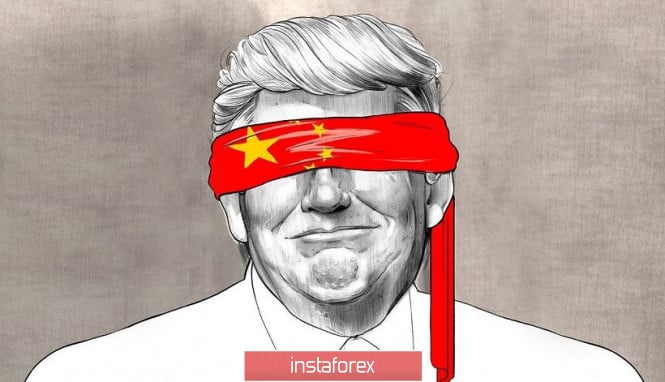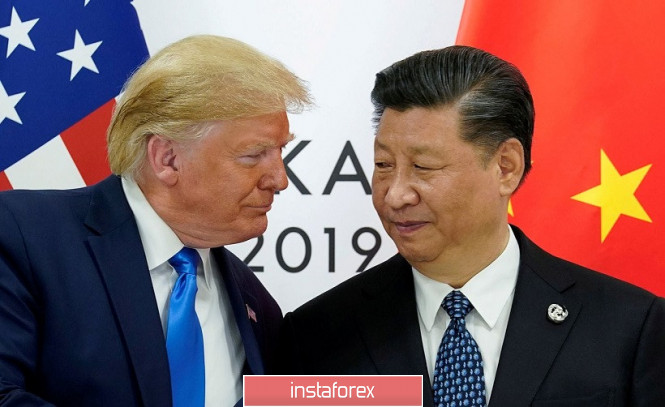The euro-dollar pair continues to trade in the flat, although the US currency is not going through the best of times: alarming rumors about the prospects for trade negotiations between the US and China put pressure on the greenback, and this fact allows EUR/USD bulls to keep the pair near the boundaries of the 10th figure. On the other hand, the euro is also under pressure from weak macroeconomic reports. Such a contradictory fundamental picture holds the price within a fairly narrow band, preventing sellers and buyers from showing character.

After a relatively small decline, the dollar index actually froze in anticipation of the next information drivers. The market is clearly discouraged by recent events, which indicate a weakening of Trump's position and tightening of China's positions in the upcoming negotiations. And if analysts had previously assumed that the Chinese would postpone the deal until the US presidential election (with the hope of Biden's victory), now China's strategy has changed, insiders say, Beijing will try to impose its terms of the trade agreement by inviting Washington to conclude a limited deal.
The White House spokeswoman today announced a meeting of representatives of the United States and China, confirming, firstly, the very fact of the planned meeting, and secondly, voicing the main topics of negotiations. It is noteworthy that the list contains such issues as reforming the industrial policy of China, industrial subsidies and intellectual property. However, according to available information, Beijing has not included the above topics in its list of proposals. According to an insider of American journalists, China decided to "bargain" more favorable terms of the deal for itself. If their plan is implemented, China will be able to remove restrictive barriers to Chinese imports, while leaving strategically important issues for itself outside the brackets of negotiations.
Let me remind you that in the spring of this year, Beijing and Washington were unable to agree on all points of a future trade deal, although Trump and many representatives of the Chinese negotiating group assured that the agreement was "90% complete". Nevertheless, the US president raised duties on Chinese goods without waiting for the end of negotiations, thereby increasing geopolitical tensions. The United States accused China of refusing part of the agreements reached in the negotiations: in particular, the Chinese refused to change national laws to protect the intellectual property of US companies, and also refused to carry out reforms in their country's industrial sphere.
Apparently, this time China repeated its maneuver and again refused to discuss the above topics. Only now Donald Trump cannot just as easily "slam the door", thereby continuing the trade war. According to opinion polls, the latest escalation of the trade war hit the rating positions of the US president quite strongly. Then the state-owned companies of the People's Republic of China "by order" stopped buying products of American farms - the Chinese with this step delivered Trump not only an economic, but also a political blow. In those states of America where agriculture predominates (in particular, Iowa, Illinois, Indiana, the Great Plains region), the electoral position of the incumbent president has noticeably shaken.
Given the ongoing scandal on the political Olympus of the United States, Trump is in a difficult situation: on the one hand, another escalation of the trade war will inevitably lead to electoral losses, on the other hand, the deal that is openly disadvantageous to Washington will be perceived by the Americans as a defeat - especially after such belligerent statements by the head White House. Therefore, it is quite difficult to predict the outcome of trade negotiations. As well as the reaction of the dollar to a possible failure in the negotiations. Indeed, in this case, with a high degree of probability, the Federal Reserve will continue to lower the interest rate, playing ahead of schedule and leveling the negative consequences of the slowdown in the global economy. This fact will put pressure on the US currency.

But also do not forget that such a scenario will provoke a "domino effect": not only the US economy, but also the export-oriented German economy, which is the "locomotive" of the eurozone, will be hit. Such prospects are fraught with retaliatory actions on the part of the ECB, especially since representatives of the European regulator and without an escalation of the trade war allow further easing of monetary policy. In addition, if Washington and Beijing disappoint traders again, anti-risk sentiment will increase in the foreign exchange market and the dollar will again turn from a "victim" into a defensive tool. During the last round of the trade conflict, the greenback was a kind of safe-haven, demonstrating an illogical, at first glance, growth.
But at the moment, the fundamental picture is not in favor of the US currency. Conflicting data on labor market growth and a rather weak forecast for inflation growth in September (the release is scheduled for Thursday) do not allow dollar bulls to dominate the pair. Therefore, we are seeing an uncertain but very persistent corrective growth of EUR/USD.
At the moment, the pair has approached the "round" resistance level of 1.1000 (the middle line of the Bollinger Bands indicator on the daily chart). If buyers overcome this target, the next resistance level will be the price 1.1070 - the lower boundary of the Kumo cloud at D1, which coincides with the upper line of the Bollinger Bands indicator. This price mark is the "ceiling" for the bulls of the pair - to overcome it, a massive weakening of the dollar across the market is necessary. The support level is still the 1.0880 mark - this is the bottom line of the Bollinger Bands indicator both on the daily and weekly charts.
The material has been provided by InstaForex Company - www.instaforex.com